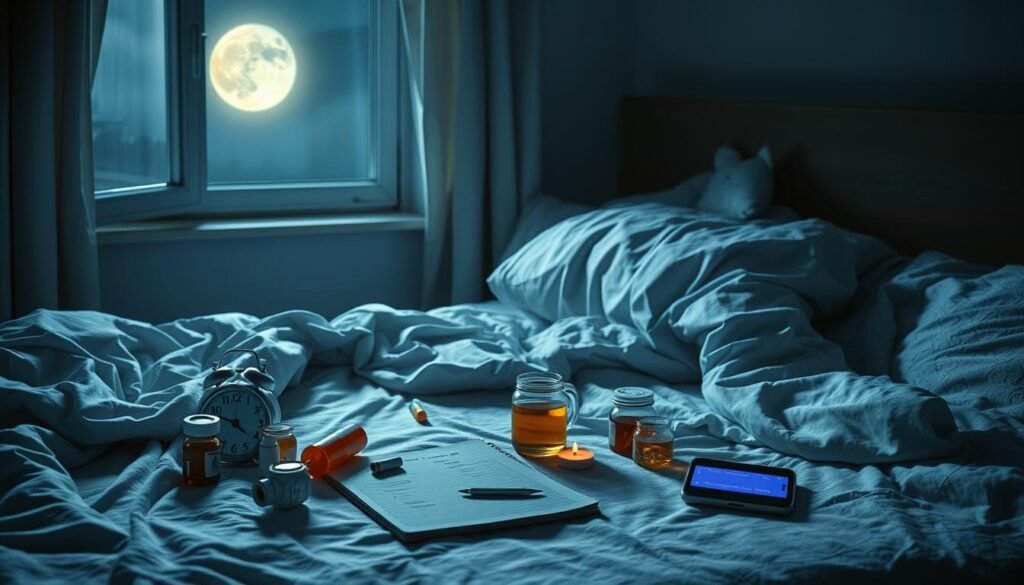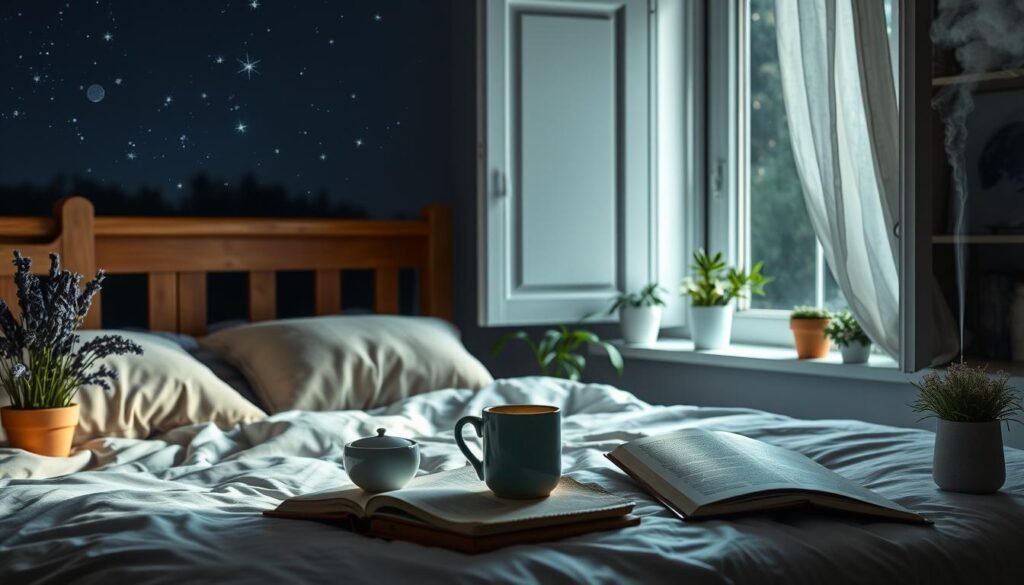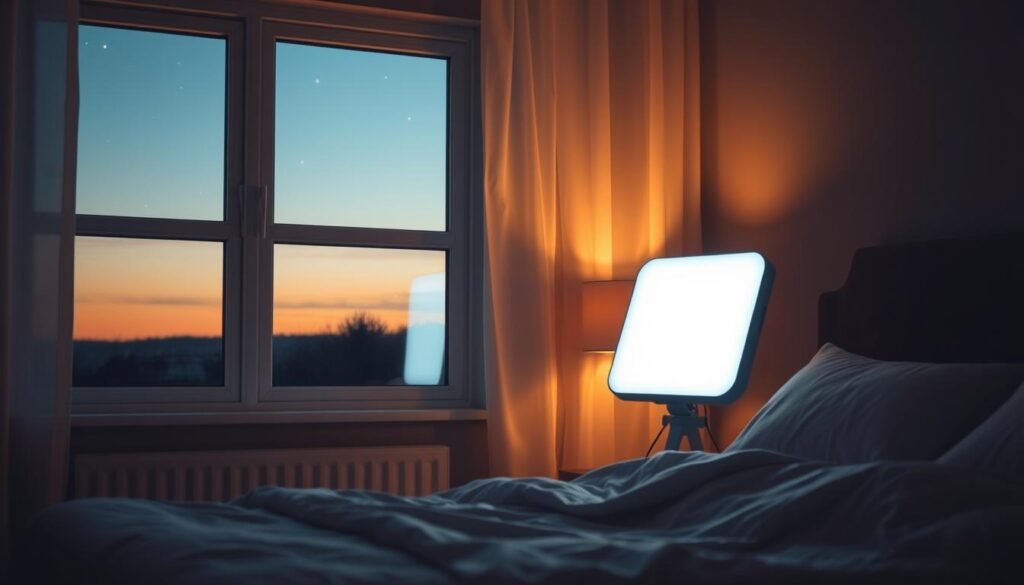About 25% to 50% of people with ADHD have trouble sleeping. This can range from insomnia to secondary sleep issues. This fact shows how ADHD can really affect a person’s ability to sleep well. For many, finding that restful sleep is hard. It makes their ADHD symptoms worse and lowers their quality of life. Solving these sleep issues is crucial for better daily function.
Luckily, there are ways to treat ADHD-related insomnia. These include behavioral changes, natural remedies, and sometimes meds. By using these methods, those struggling with ADHD can sleep better. This helps bring balance back to their lives.
Key Takeaways
- Effective treatments for ADHD insomnia include behavioral interventions and natural remedies.
- Sleep problems significantly affect individuals with ADHD, leading to daytime sleepiness and impaired functionality.
- There is a close relationship between ADHD severity and sleep disturbances, with coexisting disorders often contributing.
- Simple lifestyle changes can greatly improve sleep patterns for those with ADHD.
- ADHD-related insomnia may require a multi-faceted approach for effective treatment.
Understanding ADHD and Its Implications on Sleep
ADHD, also known as Attention Deficit Hyperactivity Disorder, affects about 5.3% of kids and teens worldwide. It has a big impact on sleep. Studies show that 25% to 55% of people with ADHD have sleep problems, like insomnia and feeling very sleepy during the day.
In an Australian study, 62% of children with ADHD had sleep issues, from moderate to severe. About 22% used sleep medicines. Also, kids with ADHD often have other conditions that make sleep problems worse. In fact, 87% of these children have at least one other condition, and 20% have three or more, making it complex to treat their sleep issues.
Polysomnographic studies, which are detailed sleep studies, found significant sleep disturbances in children with ADHD. They often have more periodic limb movements during sleep than others. Also, about 67% of them struggle to get a good night’s sleep. Plus, around 25% have sleep apnea, further complicating their sleep.
It’s vital to understand these issues to create better treatment plans for ADHD-related insomnia. Sleep problems may be due to irregular sleep schedules, medication side effects, or other mental health conditions. Establishing a healthy sleep routine can greatly help those with ADHD sleep better and improve their overall health.
Common Sleep Disorders Associated with ADHD
Many people with ADHD struggle with sleep issues. Studies show nearly 3 out of 4 kids and teens with ADHD find it hard to sleep. For adults, the number is even higher, with 4 out of 5 having sleep troubles. It’s important to know about these sleep problems to help treat them effectively.
Delayed Sleep Phase Syndrome (DSPS) is a common issue. People with it go to bed and wake up much later than usual. Those with ADHD often feel more awake at night. This makes it hard for them to sleep at normal times.
Sleep apnea and other breathing problems during sleep also happen a lot in these individuals. These issues, like snoring, can make sleep worse. This can make ADHD symptoms stronger. Also, kids with ADHD are more likely to have Restless Legs Syndrome (RLS). This can make sleeping even harder for them.
It’s key to take care of these sleep disorders. About 25% to 50% of people with ADHD have these sleep challenges. These issues don’t just affect sleep. They can also make it tougher to handle ADHD symptoms. Understanding these sleep problems well can lead to better help for those with ADHD-related sleep troubles.
The Connection Between ADHD and Sleep Problems
Many people with ADHD face sleep problems. About 25–50% report issues like insomnia, narcolepsy, and restless legs syndrome. The main reason is how their brain handles arousal and alertness. Poor sleep makes thinking harder, causing more daily challenges.
A lot of adults with ADHD struggle with insomnia. This can be due to factors such as late melatonin production and irregular sleep cycles. A study in 2019 found that nearly 19% with obstructive sleep apnea also had ADHD. This shows how closely the two conditions are linked.
Up to 44% of people with ADHD have restless legs syndrome or similar symptoms. Adults with narcolepsy are also more likely to have been diagnosed with ADHD in childhood. About 33% of people with narcolepsy have ADHD-like symptoms, showing their complex connection.
To improve sleep problems, lifestyle changes can make a big difference. It’s important to keep your sleeping area dark, quiet, and cool. Stick to a regular sleep schedule and try relaxation methods before bed. Avoiding heavy meals, caffeine, alcohol, and nicotine before sleeping is also advised. For more tips, click here.
It’s key to tackle sleep issues for those with ADHD. Making effective lifestyle changes can greatly improve their sleep. This helps lessen ADHD symptoms, boosts thinking, and improves overall health.
Factors Contributing to ADHD Insomnia Treatment
Many factors affect how well people with ADHD sleep. Studies show that 43% to 85% of them have trouble sleeping. This issue is made worse by the side effects of drugs, other mental health problems, and bad sleep habits.
Medication side effects need careful watching. Drugs like psychostimulants and atomoxetine can make sleeping harder. But, some patients find they adjust after two months, especially with methylphenidate. It’s important to keep checking how well the medicine works and its side effects.
Coexisting conditions, like anxiety and depression, make sleep worse. Adults with ADHD often have these extra mental health issues. Bad sleep can make these problems more severe, leading to worse mental and emotional health.
To sleep better, some behavior changes help a lot. Avoiding caffeine before bed and having a relaxing routine at night are good steps. When treating ADHD insomnia, these behavioral strategies should be part of the plan. They help deal with the connection between ADHD and sleep issues.

Behavioral Interventions for Better Sleep
Behavioral interventions help solve sleep problems linked to ADHD. Using cognitive behavioral therapy can make a big difference in sleep quality. It tackles harmful thoughts and actions tied to sleep. Having a regular bedtime routine tells your body it’s time to relax, helping you fall asleep faster and stay asleep longer.
Implementing Cognitive Behavioral Therapy
Cognitive behavioral therapy (CBT) is key for treating sleep woes in adults with ADHD. It works by changing negative thoughts that mess with sleep. Studies show CBT beats sleeping pills for long-term insomnia. Folks see major improvements in getting to sleep and staying asleep. The good effects can continue even after therapy ends. CBT for sleep includes:
- Changing actions that spoil sleep.
- Using sleep restriction therapy to connect bed with sleep.
- Doing stimulus control to build good sleep habits.
Creating Effective Bedtime Routines
Good bedtime routines really help people with ADHD-related insomnia. These routines make it easier to relax and get ready for sleep. Key parts of a bedtime routine are:
- A regular night schedule to keep your sleep-wake cycle steady.
- Quiet activities like reading or stretching before bed.
- Avoiding screens and lively activities as bedtime gets closer.
| Bedtime Routine Tips | Benefits |
|---|---|
| Consistent sleep schedule | Regulates sleep patterns |
| Calming activities | Promotes relaxation |
| Minimized screen exposure | Reduces stimulating effects |
Relaxation Techniques for Better Sleep
Using relaxation techniques before bed can help you sleep better. This is especially true for people with ADHD. These methods soothe your mind and body, making it easier to fall asleep. Learning and using these exercises can improve your health and happiness.
Effective Relaxation Exercises
Relaxation exercises can lower stress and get your body ready for sleep. Here are some good techniques:
- Deep Breathing: Take slow, deep breaths to calm down and feel peaceful.
- Progressive Muscle Relaxation: Tighten and then relax your muscles, starting with your toes and moving to your head.
- Visualization: Think of a calm place to help you feel safe and relaxed.
- Gentle Stretches: Do easy stretches to lessen tension and help your body unwind.
Mindfulness and Meditation Practices
Mindfulness can really help you sleep better. It teaches you to control your thoughts and stress less, which is great for people with ADHD. Try adding these to your routine:
- Mindful Breathing: Pay attention to your breathing to help calm your mind.
- Guided Meditation: Use apps or audio guides for relaxation and concentration exercises.
- Body Scanning: Notice where you’re tense and relax those areas on purpose.
- Gratitude Journaling: Think about the good parts of your day to distract from stress.
Regularly practicing these activities with good sleep habits can lead to better sleep. It helps with managing ADHD better, too. These practices lay a strong foundation for restful nights and better well-being.
Sleep Hygiene Techniques to Enhance Sleep Quality
Effective sleep hygiene can boost sleep quality for those with ADHD. A regular sleep schedule is key. It helps align your body’s clock by going to bed and waking up at the same time every day.
Making your sleeping area comfortable is essential for good rest. Keep your room cool, dark, and quiet for optimal sleeping conditions. Remove distractions like electronics to improve sleep hygiene.
Adding sleep-friendly activities to your routine can be beneficial. Exercise during the day for deeper sleep at night. A calm routine before bed, like meditation or reading, helps you ease into sleep.
It’s important to limit screen time before bed. Stay off screens for at least an hour before sleep. This helps avoid overstimulation and can improve sleep quality, especially in those with ADHD.
Behavioral changes are important for managing ADHD. Focusing on sleep hygiene can better sleep quality. This may reduce anxiety, depression, and mood issues.
| Sleep Hygiene Technique | Description |
|---|---|
| Consistent Sleep Schedule | Going to bed and waking up at the same time daily to regulate the body’s clock. |
| Comfortable Sleep Environment | A cool, dark, and quiet room that minimizes distractions for restful sleep. |
| Reduce Screen Time | Avoiding electronic devices at least an hour before bedtime to prevent overstimulation. |
| Daily Exercise | Regular physical activity during the day enhances deeper sleep at night. |
| Relaxing Bedtime Routine | Engaging in calming activities, such as reading or meditation, before sleep. |
Using these sleep hygiene tips can help those with ADHD create a sleep-friendly environment. This leads to better well-being overall.
Natural Remedies for ADHD Insomnia Treatment
Natural remedies offer a kind approach to manage insomnia in people with ADHD. These methods can add to current treatments, improving overall health. Looking into melatonin and herbal remedies can help those wanting non-medical options.
Melatonin Supplements and Their Benefits
Melatonin is key for the sleep-wake cycle. Many with ADHD struggle with sleep, making melatonin supplements a good choice. Studies show melatonin can help fix sleep schedules, especially in delayed sleep-wake phase disorder. This makes melatonin an important tool for treating insomnia in ADHD.
Herbal Remedies Like Valerian Root
Valerian root is well-known for its sleep benefits. It has helped many get better relaxation and sleep quality. This remedy calms the nervous system, good for ADHD-related insomnia. Adding valerian root to your routine may improve your sleep health.

Prescription Medications for Sleep Issues
When it comes to sleep problems, especially with ADHD, prescription drugs are key. Different types of sleep meds aim at specific issues. It’s important to know your options to treat effectively. Here’s a look at some drugs and what they do.
Overview of Potential Sleep Medications
We use several prescription medications for sleep problems:
- Benzodiazepines like alprazolam and temazepam help with short-term insomnia and issues like parasomnias.
- Non-benzodiazepine hypnotics, such as eszopiclone and zolpidem, are good for short-term insomnia too.
- Ramelteon works for insomnia by stimulating melatonin receptors.
- Antidepressants like mirtazepine and trazodone can also help with sleep, thanks to their calming effects.
Studies show adults usually need 7 to 8 hours of sleep. Yet, many adults with ADHD struggle to sleep well. They might take longer to fall asleep and wake up often. Methylphenidate, or MPH, often prescribed for ADHD, can help improve mood in the evening. It also makes it easier to fall asleep, which improves sleep quality.
Risks and Side Effects of Sleep Medications
Though helpful, sleep meds can have downsides. Watch out for:
- Dependency and withdrawal issues.
- More broken sleep.
- Changes in sleep stages, with more light sleep.
- Interactions with other drugs or medical conditions.
Ramelteon, for instance, can lead to more interrupted sleep. Always personalize medication use. A healthcare pro should guide and monitor usage.
The Role of Light Therapy in Sleep Regulation
Light therapy is gaining popularity for improving sleep quality. It’s particularly useful for those with ADHD symptoms. Morning exposure to bright light helps regulate sleep. It resets the body’s internal clock, addressing sleep issues seen in ADHD treatment.

Light therapy sessions with a 10,000 lux light box last 20 to 40 minutes. For lower intensity needs, like 2,500 lux, sessions can go up to 2 hours. People often see improvements in days, but bigger changes may take two weeks.
It offers a drug-free way to combat ADHD-related insomnia. You can do it at home, making it easy to fit into busy schedules. While not effective for everyone, success can be boosted by the right light box or combining it with psychotherapy.
Side effects of light therapy might include eye strain, headaches, and nausea. Those with certain eye issues, like cataracts, should avoid it. However, light therapy is mostly safe. It doesn’t expose users to harmful UV rays.
Light therapy is a hopeful option for those with ADHD struggling with sleep. It effectively helps manage sleep cycles. For more details on light therapy and ADHD, click here.
Lifestyle Changes to Improve Sleep Patterns
Making lifestyle changes greatly helps improve sleep for those with ADHD. A regular routine and good health habits fight ADHD-related sleep problems.
Doing regular physical activity is key. Exercise promotes better sleep and reduces ADHD symptoms. Try to get at least 30 minutes of exercise several times a week. It eases insomnia and helps with relaxation, crucial for improving sleep.
Eating habits are also important for sleep. Avoiding caffeine and sugar before bed can reduce hyperactivity and restlessness. Eating foods high in magnesium and omega-3s helps with better sleep.
Keeping a daily routine aids in regulating sleep. Having set times for going to bed and waking up builds a healthy sleep pattern. This routine lessens the impact of ADHD symptoms, leading to better sleep.
For more details on ADHD and sleep, check this helpful resource. Positive lifestyle changes improve overall health and manage ADHD effectively. This ensures improved sleep hygiene.
Conclusion
Dealing with ADHD-related insomnia is key to better life quality. Many adults with ADHD also battle insomnia. This can lead to more than just tiredness.
Not sleeping enough can harm job performance, focus, and increase accident risks. Using CBT-I and natural sleep aids like melatonin can help.
Also, talking to doctors about medicines like Ambien and Trazodone may help. But, these drugs can have side effects. So, it’s vital to find treatments that suit the individual by looking at various strategies.
Those with ADHD should try to fix their sleep issues. Making changes to daily habits and using relaxation methods can boost sleep quality. A good sleep leads to better daily function and overall health.